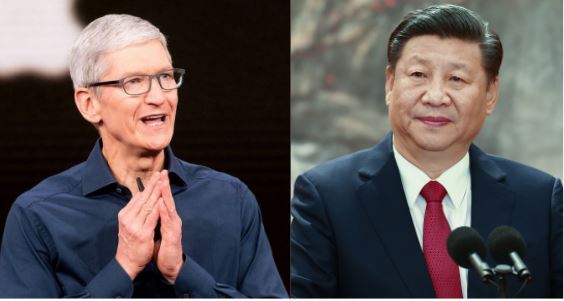While US President Donald Trump is fighting tooth and nail against the authoritarian regime of Xi Jinping, Apple, one of the biggest tech conglomerates in the world is prostrating in front of China. According to a report in The Verge, Apple had to reportedly pull out 47,000 apps from the Chinese App Store earlier this month after the CCP regime side-armed the tech behemoth into submission.
This is not the first time that Apple has submitted itself to the whimsies of CCP; there is a long list of incidents where Apple meekly has accepted its fate, just so it keeps running its business in Mainland China.
In April 2016, Chinese regulators had put their foot down and ordered Apple to shut down the iBookstore and iTunes Movies, just six months after Apple launched those stores in the country. And at that time too, Apple did not show the spine to take on the CCP.
Last year during the Hong Kong protests, the Silicon Valley-based company had removed the HKMapLive app which was used by protest organizers to track police activity—after the mouthpiece of CCP, Global Times started criticizing the app.
The company tried to douse the fire of negative PR by saying that it has made the decision on its own accord and not because of the Chinese state-owned media’s pressure but the reality was clear as chalk and cheese.
In 2019, Apple had removed the artists and songs that referred to the Tiananmen Square massacre after the Xi Jinping regime ordered it to do so. One of the bands, a Hong Kong duo called Tat Ming Pair, released a Tiananmen tribute called “Remembering is a Crime” which was instantly removed by Apple.
Reason? Apple is the only big American tech company in China
The reason for Apple nodding its head to everything Xi Jinping has to say is fairly obvious–out of the big ‘silicon-six’ of the tech world, only Apple has been able to penetrate the highly obstructed Chinese market. Google, Facebook, Twitter, YouTube—each one of them has taken multiple cracks to enter the lucrative market of China but so far failed.
Google officially bowed out of China in 2010 but tried a covert ‘Project dragonfly’ operation two years earlier to sneak into China. When the news of the covert operation came to light, Google for good wrapped its ambitions for China.
Facebook was denied entry into China in 2009, and the recent anti-trust hearings in the senate are enough to tell you that Mark Zuckerberg has no love for the middle kingdom.
But Apple’s cash cow, iPhone was an instant hit in the communist state and it was the inroad for the company currently headed by Tim Cook. Apple’s iPhones were first launched in China in 2009, two years after sales began in the U.S., and the company has shipped more than 210 million units in the country over the past five years, according to Bloomberg.
China is Apple’s largest market after the US and Europe and has been its most important source of new growth for much of the last decade.
More than a fifth of all smartphone users in China used an iPhone as of June, second only to Huawei at 26 per cent.
225 per cent jump in sales of iPhone in China
Since a low in February, when Apple sold fewer than 500,000 phones, the company has seen a steady rebound and according to CNBC research data, Apple was the fastest-growing smartphone maker in China in the second quarter as it saw a whopping 225 per cent jump in its sales.
The sell-through volume for iPhones in China was 7.4 million units in the April to June quarter, a 32% growth year-on-year.
Tim Cook and Apple, keeping mum on China but attacking Trump’s trade-wars
CEO Tim Cook has been outspoken about his disagreements with the Trump administration on trade wars as China can effectively use it as an opportunity to run the company to the ground in the country.
During the senate hearing, Amazon, Google, and Facebook were on the same page for attacking China but Apple steered away from making any sweeping statements.
With Trump banning US companies from making a bed with Chinese company WeChat through an executive order, Apple’s fortunes in the red-authoritarian country have been given a major jolt.
WeChat is one of the super apps that are ingrained in the daily day-to-day life of a modern Chinese serendipitously. The businesses run on this app and if Apple will not be allowed to install the app on its iPhones than the Chinese will move away from it.
The executive-decision will come into force in the upcoming 3-4 months and therefore Apple is leaving no stone unturned to gain favour from the Chinese, even if it means accepting every little order from the CCP masters.
On one hand, Apple is a woke consumer tech company that cares about you, your privacy, and the rest of the world. On the other, Apple is deeply enmeshed in a country that supports (state-approved) capitalism but not civil liberties. Apple is in a catch-22 situation and since it is a private entity, profits precede country sentiments and consequently, it is toeing China’s line.
